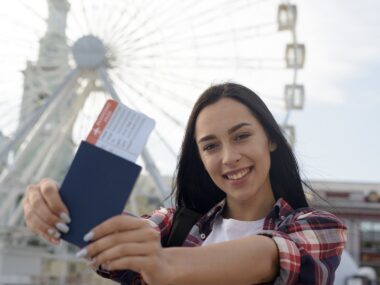Germany is now one of the most sought-after destinations for immigrants looking to secure long-term employment and legal residency in Europe. With its booming economy, government-backed visa sponsorship programs, and structured immigration pathways, Germany offers a golden opportunity for foreign workers, especially those who qualify for sponsored jobs. From healthcare to skilled trades and tech roles, thousands of companies in Germany are actively hiring international talent and providing full relocation assistance, including work visas and support with permanent residence applications. If you’re planning to move abroad in 2025, this guide reveals how to legally relocate to Germany, get a sponsored job, and access premium benefits like housing support, healthcare, and long-term settlement options.
What Is Visa Sponsorship in Germany?
Visa sponsorship in Germany is a formal immigration process where an approved entity, typically an employer, educational institution, or immediate family member, takes legal responsibility for supporting a foreign national’s stay and application for residency. In most work-related cases, a German company offers a job to a qualified non-EU applicant and commits to fulfilling immigration requirements on their behalf. This includes providing official job contracts, financial guarantees, and supporting documentation for work and residence permits.
Employer-sponsored visas in Germany are especially common in sectors facing labor shortages, such as healthcare, IT, construction, and logistics. These companies often collaborate with certified immigration consultants, legal advisors, and visa processing agencies to ensure full compliance with German immigration laws. With proper sponsorship, foreign applicants can fast-track their visa approval, access government-backed relocation programs, and eventually qualify for permanent residency or citizenship through structured legal pathways.
Whether you’re applying for a skilled worker visa or exploring unskilled labor routes, having a sponsor significantly increases your chances of approval—while reducing the risk of application rejection or legal delays.
Types of Germany Visas with Sponsorship Opportunities (2025 Update)
Germany provides multiple visa pathways for foreigners looking to live, work, study, or join family, many of which offer sponsorship options that ease the immigration process. Whether you’re a skilled worker, student, entrepreneur, or dependent, having a sponsor can significantly increase your chances of approval and open doors to long-term residency.
1. Skilled Worker Visa (Arbeitsvisum)
This visa is designed for qualified professionals with foreign credentials recognized in Germany. To qualify, applicants must secure a confirmed job offer from a registered German employer and meet specific salary thresholds, typically between €39,000 to €45,000 annually, depending on the occupation. Common industries offering sponsorship include:
- Healthcare (nurses, caregivers)
- IT & Software Development
- Skilled trades (electricians, plumbers, welders)
- Engineering & Manufacturing
The sponsoring employer assists in submitting all required documents to the German Foreigners’ Authority (Ausländerbehörde), making the process faster and legally compliant.
2. EU Blue Card
Targeted at highly educated non-EU nationals, the EU Blue Card offers a fast-track route to permanent residency in Germany. To qualify, applicants must:
- Hold a recognized university degree
- Earn a minimum salary of €45,300 per year (or €41,000 for shortage occupations like IT and healthcare)
- Receive a job offer from a licensed German company
One major advantage: family members can relocate with the primary applicant and receive immediate work rights upon arrival.
3. Family Reunification Visa
Germany supports legal family reunification, allowing spouses, minor children, and dependent relatives to join residents or citizens. The sponsor (resident family member) must demonstrate:
- Stable income and employment
- Adequate accommodation
- Health insurance coverage
- Valid proof of relationship (marriage or birth certificates)
This visa provides a pathway to long-term residence and, eventually, permanent settlement.
4. Student Visa (With Post-Graduation Work Sponsorship)
International students accepted into German universities or vocational training programs can apply for a student visa. Key requirements include:
- Letter of admission
- Proof of financial means (approx. €11,208/year in a blocked account or an approved scholarship)
- Health insurance and accommodation plan
After completing their studies, students can switch to a Job-Seeker or Work Visa, and many institutions partner with career placement agencies to support post-graduation employment and sponsorship opportunities.
5. Self-Employment & Freelancer Visa
Germany offers dedicated visa routes for entrepreneurs, freelancers, and digital nomads. Applicants must:
- Present a viable business plan
- Demonstrate financial independence
- Show economic benefit to the German market
Sponsorship here is self-backed, but applicants may still require letters of intent from clients or collaborators within Germany. This visa is popular among:
- Tech founders
- Creative professionals
- Consultants and remote service providers
It’s also supported by business visa agencies and freelancer visa consultants, making it an appealing target for B2B advertisers.
Top German Companies Hiring Foreign Workers With Visa Sponsorship in 2025
Germany’s labor market continues to face critical shortages in multiple sectors, creating a golden opportunity for foreign job seekers. Many top-tier German companies are now offering visa sponsorship, relocation packages, and competitive salaries for both skilled and unskilled workers from outside the EU.
Here are some of the top companies hiring in 2025 and how much they pay:
1. Deutsche Post DHL Group
- Roles: Warehouse staff, logistics operators, package handlers
- Sponsorship: Yes – including relocation support and visa processing
- Salary: €2,300 – €3,200/month for entry-level logistics staff
- Why it matters: One of Germany’s largest employers of foreign workers; often partners with global recruitment agencies
2. Siemens AG
- Roles: Engineers, IT specialists, data analysts, project managers
- Sponsorship: Yes – especially for Blue Card applicants
- Salary: €55,000 – €95,000/year depending on experience
3. Volkswagen Group
- Roles: Manufacturing technicians, quality control, automation experts
- Sponsorship: Actively recruits foreign technical talent
- Salary: €3,000 – €5,000/month + overtime + housing allowance
4. Charité – Universitätsmedizin Berlin
- Roles: Nurses, medical technicians, healthcare assistants
- Sponsorship: Yes – healthcare professionals prioritized
- Salary: €3,500 – €4,800/month depending on certification
- Notes: Offers legal visa support, language training, and housing aid
5. Bosch Group
- Roles: Mechatronics engineers, developers, production assistants
- Sponsorship: Yes – via structured Blue Card pathways
- Salary: €50,000 – €85,000/year
Want to Get Hired Faster?
Use a certified German recruitment agency, or contact a licensed visa consultant to help you secure job sponsorship, process your documents, and fast-track your move.
Step-by-Step Guide to Applying for a Sponsored German Work Visa (2025)
Applying for a German work visa with sponsorship can feel overwhelming, but with the right steps, the process becomes much easier. Below is a simplified breakdown of how to legally move to Germany for work under a sponsorship arrangement.
Step 1: Get a Verified Job Offer from a German Employer
Before applying for a visa, you need a signed employment contract or official offer letter from a registered German company. This will act as your primary sponsorship document. Look for roles that include phrases like “visa sponsorship available” or “international candidates welcome.”
Step 2: Confirm That You Meet the Visa Requirements
Each work visa category has specific rules. You must:
- Have relevant qualifications or work experience
- Meet the minimum salary threshold (e.g., €39,000–€45,000/year)
- Provide proof of health insurance and clean background record
Check the requirements listed on the Federal Foreign Office website or through certified visa agents.
Step 3: Collect Required Documents
You’ll need to prepare:
- Valid international passport (minimum 12 months)
- Job contract or offer letter
- Academic/professional certificates
- CV/resume
- Proof of health insurance
- Passport-sized photographs
- Visa application form (completed and signed)
Tip: Use certified translators if your documents aren’t in German or English.
Step 4: Schedule an Appointment with the German Embassy or Consulate
Book a visa interview at your nearest German consulate or embassy. Demand can be high, so schedule early and prepare well. Bring all original documents, including copies.
Step 5: Attend Your Interview and Pay the Visa Fee
At the interview, you’ll:
- Submit your documents
- Answer basic questions about your job, accommodation, and plans in Germany
- Pay a visa processing fee (typically around €75)
Step 6: Wait for Processing and Collect Your Visa
Visa approval usually takes 4–8 weeks depending on your case. Once approved, you’ll be notified to collect your visa or receive it by mail. You can then prepare for your flight and arrival in Germany.
Bonus Tip:
Many applicants speed up this process by using licensed immigration consultants, relocation experts, or international recruitment platforms.
How Nigerians Can Find Visa Sponsorship Jobs in Germany Online (2025 Guide)
Germany is one of the top destinations for Nigerians seeking legal employment opportunities abroad. With a robust economy, increasing labor shortages, and clear immigration policies, Germany continues to welcome foreign talent — especially through employer-sponsored work visas. The best part? You can now apply 100% online from Nigeria, without using third-party agents that may charge hidden fees.
Why Germany Is Hiring Nigerians in 2025
Germany faces a growing skills shortage in industries such as healthcare, construction, logistics, IT, and hospitality. To solve this, the government has simplified the process for non-EU foreign workers, especially from developing countries like Nigeria. Employers in Germany are now actively offering:
- Visa sponsorship
- Relocation support
- Legal assistance for documentation
- Work permits and accommodation
This demand has opened up more high-paying jobs with visa sponsorship — all accessible online.
Where Nigerians Can Find Genuine Visa Sponsorship Jobs in Germany (Online Sources)
Below are the most trusted platforms to find legitimate German jobs offering visa sponsorship for Nigerians:
1. Make Use of Germany’s Official Job Portal – “Make it in Germany”
- Website: make-it-in-germany.com
- This is the official government-run job portal that lists verified job offers from German companies.
- Use filters like: “Visa sponsorship available”, “English-speaking,” or “Foreign applicants welcome”
2. Apply Through LinkedIn – Remote Access to German Recruiters
- Optimize your LinkedIn profile with keywords like: “Open to relocation,” “Nigerian applicant seeking German sponsorship,” etc.
- Search jobs using filters like “visa sponsorship,” “relocate to Germany,” or “work permit included.”
Tip: Connect directly with HR Managers of German companies. Many actively post visa-ready openings and can refer you directly.
3. Use Job Boards With Sponsorship Filters
Here are job websites where Nigerians can apply for verified jobs with sponsorship:
- Glassdoor Germany – glassdoor.de
- StepStone Germany – stepstone.de
- Indeed Germany – indeed.de
- Jooble – jooble.org
- Relocate.me – Focused on tech jobs with visa support
4. Use German Recruitment Agencies That Sponsor Foreign Applicants
Many authorized recruitment agencies in Germany specialize in helping foreign nationals, including Nigerians — secure employment with full sponsorship. Some of these agencies work in partnership with employers and government initiatives.
Examples:
- Global Skilled Migration Agencies
- GERVIS Recruitment
- MedPharmCare (for Nurses & Healthcare Staff)
- TopTech Talent (for IT Roles)
Always verify that the agency is licensed and listed on German government directories.
- Jobs in Germany for Foreigners – niche listings that target skilled and unskilled visa-ready jobs
What Documents Do Nigerians Need to Apply for Sponsored Jobs in Germany Online?
Before applying, prepare the following documents:
- Valid international passport (12+ months left)
- Updated CV (Europass format recommended)
- Academic or professional certificates
- Letter of motivation
- Professional reference letters
- Proof of English or German proficiency (if required)
- Valid police clearance and health certificate
Having these ready ensures fast response from recruiters and avoids delays during the visa processing stage.
Boost Your Chances with Legal Immigration Assistance
While you can apply independently, many Nigerians speed up their approval and reduce mistakes by working with:
- Certified German immigration lawyers
- Visa processing consultants
- Relocation agencies that partner with companies
These services help you:
- Translate and notarize your documents
- Navigate embassy appointments
- Follow up on applications
- Secure pre-approval from the Federal Employment Agency (ZAV)
Expected Salary Range for Sponsored Jobs in Germany (2025)
| Job Role | Monthly Salary (€) | Visa Sponsorship | Industry |
|---|---|---|---|
| Healthcare Assistants | €3,200 – €4,500 | yes | Healthcare |
| Welders / Technicians | €2,800 – €3,800 | yes | Construction |
| Truck Drivers / Delivery Ops | €2,300 – €3,200 | yes | Logistics / Transport |
| IT Professionals | €4,500 – €7,000 | yes | Tech / Engineering |
| Hospitality Workers | €2,000 – €2,800 | yes | Hotels & Tourism |
These salary ranges are pre-tax, and most sponsored jobs also include benefits like:
- Accommodation assistance
- Health insurance
- Paid vacation
- Public transport discounts
Benefits of Getting Sponsored for a Germany Visa
A sponsored Germany visa offers a fast and legal route to live and work in the country under official immigration programs. With employer sponsorship, applicants gain authorized employment, full labor protections, and access to essential public services like healthcare and insurance.
It also enables family reunification, allowing spouses and children to join and benefit from Germany’s education and social systems. Sponsored employees are eligible for career advancement programs, and over time, they can apply for permanent residency — typically after 33 months, or 21 months with B1 German proficiency.
With continued legal residence, sponsored migrants may qualify for German citizenship after five to eight years, depending on integration and legal status — unlocking full rights and mobility within the EU.
Challenges Immigrants May Face
Although Germany has opened more doors to foreign workers through structured immigration policies, applicants may still face several obstacles during the visa process:
Language Requirements: Many job roles and integration programs require at least a basic understanding of the German language, especially for public-facing or regulated positions.
Limited Sponsorship Opportunities: Not all employers are registered or authorized to offer visa sponsorship, which reduces the number of eligible job openings for foreign applicants.
Strict Documentation Process: Errors, missing documents, or lack of certified translations can lead to significant delays or even disqualification during visa review.
Risk of Visa Denial: Applications may be rejected due to inadequate qualifications, insufficient financial proof, incomplete employer documentation, or issues with sponsorship legitimacy.
How to Improve Your Chances of Getting a Sponsored Germany Visa
To increase your chances of securing a sponsored work visa to Germany, it’s essential to take strategic steps that align with current immigration and labor market demands.
Start by targeting high-demand industries such as healthcare, information technology, skilled trades, or engineering — sectors where German employers are actively seeking foreign talent and are more likely to provide visa sponsorship.
Ensure your qualifications are internationally recognized and, if possible, formally assessed or validated by German regulatory bodies. This adds credibility to your application and helps meet visa eligibility requirements faster.
Language plays a key role in integration, so consider enrolling in a German language course through an accredited institution like the Goethe-Institut. Achieving at least A1 or B1 proficiency improves your employability and supports visa compliance.
Whenever possible, apply to verified employers who are registered to sponsor international workers. For complex cases or higher success rates, consider working with certified immigration consultants or legal advisors familiar with Germany’s visa process.
Finally, begin your visa preparation and job search at least 4 to 6 months in advance. Early preparation helps you meet documentation requirements, secure an interview slot at the consulate, and avoid delays that could affect your travel plans.
Frequently Asked Questions (FAQs) About Germany Visa Sponsorship
1. Can I get a German work visa without a sponsor?
In most cases, a verified sponsor (usually an employer) is required to obtain a German work visa. However, individuals applying as freelancers or entrepreneurs may be eligible for a self-sponsored visa if they can present a legally compliant business plan and meet financial requirements.
2. How long does it take to get a sponsored visa for Germany?
Processing times for sponsored German visas typically range from 4 to 12 weeks, depending on the visa category, the German embassy or consulate handling the application, and the accuracy and completeness of your submitted documents.
3. What is the minimum salary required for the EU Blue Card in 2025?
For 2025, the minimum salary threshold for the EU Blue Card is approximately €45,300 per year. For occupations in shortage sectors such as IT, healthcare, engineering, or scientific research, the minimum requirement is reduced to about €41,000 annually.
4. Can I bring my family if I receive a German work visa?
Yes. Most long-term work visas and sponsorship categories allow for family reunification, enabling you to bring your spouse and dependent children to Germany. In many cases, your partner will also be granted work rights, and children can access free or subsidized education.
5. What should I do if my visa application is denied?
If your German visa is rejected, you can appeal the decision or submit a new application with improved documentation or a stronger sponsor. It’s highly recommended to seek guidance from a licensed immigration lawyer to identify the cause of denial and improve your chances on reapplication.



